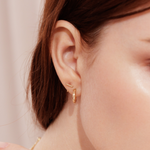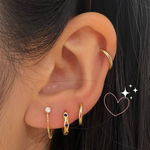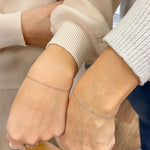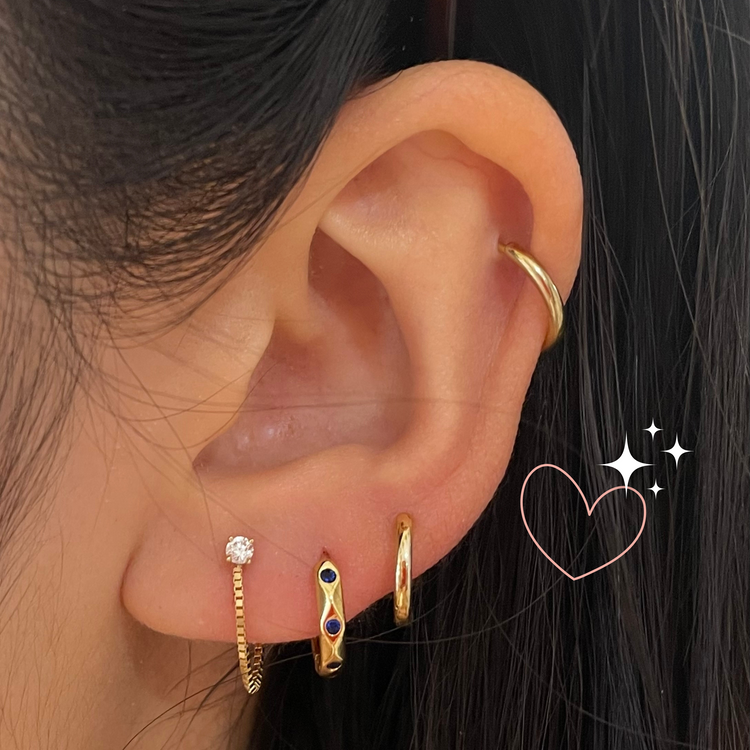Sensitive ears? Your guide to earring allergies
Sensitive ears? Your guide to earring allergies
Love earrings but hate the irritation? You’re not alone. Earring allergies are more common than you might think, but luckily, they’re also easy to avoid once you know what’s causing the problem. Whether you’re allergic to nickel, dealing with irritation from cheap materials, or just have sensitive skin, there are plenty of ways to enjoy your jewelry without the discomfort. Let’s dive into what causes earring allergies, how to spot the signs, and how to choose the best earrings for your skin.
What causes earring allergies?
Earring allergies are often caused by the materials used in the jewelry itself. The most common culprit? Nickel. It’s widely used in many types of earrings, but it can be one of the most irritating metals for people with sensitive skin. Nickel isn’t the only problem though - metals like brass, copper, and other cheap alloys can also cause allergic reactions.
Here’s a quick rundown of what might be causing those itchy ears:
Nickel sensitivity. Nickel is found in many lower-quality earrings. It’s a common culprit behind that unbearable itch or redness you’re probably familiar with.
Plating woes. If your earrings are plated, the plating can eventually wear off, exposing your skin to the base metals underneath. And guess what? Those metals might not be so friendly to your sensitive ears.
Low-quality alloys. Brass, copper, and other alloys can cause reactions too. While they might look cute at first glance, they’re usually a big no-no for anyone with sensitive skin.
How do you know if you have an earring allergy?
Before you panic and toss your entire jewelry box out the window, let’s go through the classic symptoms of an earring allergy:
-
Itchy ears: If your earlobes start itching or feeling uncomfortable after wearing new earrings, it could be a sign of an allergic reaction.
-
Redness or swelling: Earlobes that look like they’ve just done 10 rounds with a boxing glove are a definite sign that something isn’t right.
-
Pain or tenderness: A severe earring allergy can cause pain even with the slightest touch. If you’ve ever flinched after getting your earring caught in your hair or felt a sharp sting when adjusting your earrings, that’s your skin’s way of saying "enough!".
And in the worst-case scenario, you could even get blisters or peeling skin. Not cute. If you’re experiencing any of these symptoms, it’s definitely time to take action.
So, how do you prevent or manage earring allergies?
Whether you're looking to make your existing earrings more wearable or are just ready to upgrade to some hypoallergenic magic, here are a few things you can do to keep those ears happy:
Pick earrings made of hypoallergenic materials
Say it with us: Surgical steel, titanium, 14K gold, and platinum are your new best friends. These materials are much less likely to cause reactions, even if your ears are extra sensitive. Bonus: They look great and are durable too.
Avoid plated earrings
While we’re huge lovers of high-quality plated earrings, if you know that your skin is extra sensitive, save your lobes the drama and stick with non-plated pieces. Your skin will thank you for it.
Skip the nickel
Nickel is the number one culprit behind most earring allergies. While it’s widely used in jewelry, it’s also one of the most irritating metals for sensitive skin. Look for pieces that are nickel-free or made with hypoallergenic metals like surgical steel, titanium, or solid gold to avoid the itch.
Choose comfortable earring designs (like flatbacks)
If you want to keep your ears comfortable all day long, go for designs that are gentle on your skin. Flatback earrings are a game changer - they’re smooth and sit flush against your ear, reducing any friction and irritation.
Keep them clean
Yep, even the most fabulous earrings need a little TLC. Make sure to clean your jewelry regularly to avoid the buildup of oils, dirt, or other things that might irritate your ears.
With these simple steps, you’ll be able to enjoy your favorite earrings without the discomfort, and your ears will certainly thank you for it!
Earring allergy FAQs
How can I tell if I’m allergic to earrings?
If your ears are itching, swelling, or becoming red after wearing earrings, it could be an allergic reaction. The most common culprit is nickel, but other metals or alloys can also be responsible.
Can I still wear earrings if I have an allergy?
Yes! You just need to choose earrings made from hypoallergenic materials, such as titanium, surgical steel, or 14K gold. These metals are much less likely to cause irritation.
What should I do if my earring allergy doesn’t go away?
If your ears continue to react despite switching to hypoallergenic jewelry, it’s a good idea to consult with a dermatologist. They can help determine the cause of the reaction and suggest additional solutions.















Leave a comment